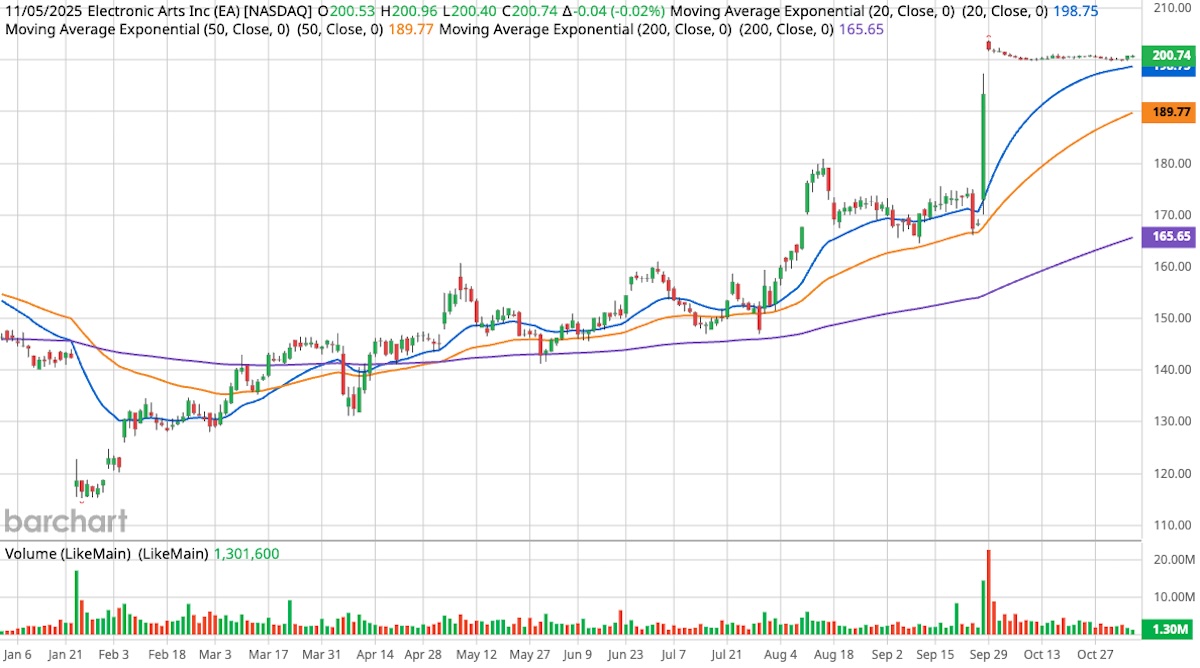Largest Leveraged Buyouts of All Time: How This Video Game Maker is Set to Become the Biggest of Them All
The massive $55 billion take-private of Electronic Arts shatters a nearly two-decade-old record, signaling a bold new era for mega-deals and testing Wall Street's appetite for risk.

The pantheon of financial titans just welcomed a new king, and it comes from an unlikely industry. The world of high-stakes leveraged buyouts (LBOs), a realm defined by private equity “barbarians,” colossal debt, and audacious ambition, has a new record-holder. Video game maker Electronic Arts (NASDAQ: EA), the creative force behind franchises like Madden NFL and Battlefield, agreed to a go-private transaction valued at a staggering $55 billion. This monumental deal ends the nearly 18-year reign of the $45 billion-plus TXU buyout, a 2007 energy-sector behemoth engineered by KKR & Co. (NYSE: KKR) and TPG. The EA deal signals that even in a world of higher interest rates, the appetite for the mega-deal remains voracious.
Also Read: Why Big Investors Who Can’t Buy Crypto Are Gobbling Up These Stocks Instead
The New King of LBOs
The consortium of buyers, led by technology-focused private equity firm Silver Lake Management, agreed to pay $210 per share in cash for Electronic Arts. This price represents a hefty 25% premium over the stock’s unaffected price, a clear signal of the buyers’ conviction. The other partners in this colossal venture include Saudi Arabia’s Public Investment Fund (PIF) and Jared Kushner’s Affinity Partners.
To understand the sheer scale of this $55 billion transaction, one must look at the legends it now surpasses. The TXU deal, which topped $48 billion including debt, held the crown for almost two decades. Other giants, like the 2022 buyout of Italian infrastructure group Atlantia ($45B) and the 2007 take-private of Equity Office Properties by Blackstone (NYSE: BX) for $34.1B, also fall short. This deal even dwarfs the $30.1 billion acquisition of RJR Nabisco in 1989, the legendary battle immortalized in the book and film Barbarians at the Gate.
Transactions of this magnitude are incredibly rare. Only a handful of global investors possess the capital and audacity to orchestrate them, a club that includes household names like KKR, Blackstone, The Carlyle Group (NASDAQ: CG), and Bain Capital (NYSE: BCSF). Pulling them off requires threading a needle, balancing massive equity commitments with tens of billions in debt, a feat made exponentially harder in today’s higher-interest-rate environment.
Barbarians at the Gate: KKR and RJR Nabisco Leveraged Buyout Scene

Source: Professor Drou YouTube
A High-Stakes Bet for Wall Street
While the private equity firms celebrate, Wall Street bankers are positively salivating. The syndicate of banks arranging the financing stands to share a fee pool estimated at roughly $500 million. Two of Wall Street’s biggest names, Goldman Sachs (NYSE: GS) and JPMorgan Chase (NYSE: JPM), landed the lead roles. Goldman Sachs is advising the target, Electronic Arts, a move that cements its position as the top global M&A adviser.
But the real story is JPMorgan. The bank, led by CEO Jamie Dimon, is playing both sides. It serves as financial advisor to the Silver Lake-led consortium and is committing the entire $20 billion debt package. This marks the biggest debt commitment ever by a single lender for an LBO. It’s a massive gamble. If JPMorgan successfully syndicates the debt, slicing it up and selling it to hedge funds, pension funds, and other investors, it will cement its dominance in leveraged finance. If the market sours, as it did during Elon Musk’s Twitter buyout, JPMorgan could be stuck holding billions in junk-rated debt on its own balance sheet. This deal is a major win for traditional banks, demonstrating their financing muscle still outmatches the fast-growing $1.7 trillion private credit industry in jumbo transactions.
Also Read: How to Capitalize on the Five Pillars of Growth in the Red-Hot Wearables Market
Why EA? Why Now?
Why would this consortium take on $20 billion in debt to buy a video game company? The answer lies in the LBO formula. Private equity firms typically target returns of 20%, far higher than the 5.5% average cost of leveraged debt. By using borrowed money, they amplify their returns on a smaller amount of their own capital. For this to work, the target company must be a robust, predictable cash-flow machine.
Electronic Arts is the perfect target. While some observers view the $178 billion video-game industry as struggling for growth, buyers see a software asset resistant to AI disruption. EA’s crown jewels, EA Sports FC, Madden NFL, Apex Legends, and The Sims, are not just games; they are live services that generate billions in stable, recurring revenue from loyal players. That predictable cash flow is precisely what bankers require to service the mountain of new debt.
Each member of the consortium has a clear motivation. For Silver Lake, it’s a signature deal in their technology sweet spot. Egon Durban, Co-CEO of Silver Lake, explained:
“This investment embodies Silver Lake’s mission to partner with exceptional management teams at the highest quality companies. EA is a special company: a global leader in interactive entertainment, anchored by its premier sports franchise, with accelerating revenue growth and strong and scaling free cash flow.”
For the Saudi PIF, it’s a strategic move to diversify from oil and build a global e-sports hub. “PIF has demonstrated a strong commitment to these sectors, and this partnership will help further drive EA’s long-term growth, while fueling innovation within the industry on a global scale,” said Turqi Alnowaiser, Deputy Governor of PIF.
For EA’s management, this buyout offers a crucial escape. The company’s own employee FAQ states, “Being a private company allows EA to adopt a longer-term investment horizon, with greater latitude to pursue bold strategies without quarterly public market response.”
CEO Andrew Wilson, who will remain at the helm, echoed this sentiment:
“Looking ahead, we will continue to push the boundaries of entertainment, sports, and technology, unlocking new opportunities. Together with our partners, we will create transformative experiences to inspire generations to come. I am more energized than ever about the future we are building.”

The Path Forward: Promise and Peril
This historic transaction, expected to close in the first quarter of fiscal year 2027, is not without risk. The $20 billion debt package, likely rated single-B junk, must now be sold. Its sheer size will test the market’s capacity, especially as investors reel from recent corporate collapses like First Brands Group.
The deal also delivers immense value to existing shareholders. Luis A. Ubiñas, Lead Independent Director of EA’s Board, confirmed the board’s reasoning:
“We are pleased that this transaction delivers immediate and certain cash value to our stockholders while strengthening EA’s ability to continue building the communities and experiences that define the future of entertainment.”
To fund the debt, EA confirmed it will sunset its stock repurchase program and quarterly dividend. While the company assures the new debt load will not impact investment in its games, players and employees worry. The history of LBOs, from the $27.6 billion H.J. Heinz deal by Berkshire Hathaway (NYSE: BRK.A; BRK.B) and 3G Capital to others, is rife with examples of aggressive cost-cutting to meet debt obligations. The new owners must now balance their 20% return targets with the creative demands of a company built on innovation. The barbarians are at the gate, but this time, they’re ready to play Battlefield.
Lock & load for the ultimate all-out war experience in #Battlefield6.
Live gameplay stream hits July 31: https://t.co/9ybuBCoyTa pic.twitter.com/CCmiGwOP7R
— Battlefield (@Battlefield) July 24, 2025
Small Cap News Movers & Winner Deep Dive – By WealthyVC.com
We scan over 10,000 publicly listed stocks across all seven North American exchanges to uncover the market-moving news that actually matters—focusing on high-quality, liquid, growth-oriented companies in sectors attracting serious capital, like AI, blockchain, biotech, and consumer tech.
Each week, we publish Small Cap News Movers, a curated roundup of small and micro-cap stocks surging on meaningful catalysts. We break down what’s driving the move, tap into rumors swirling on social media, and surface sharp insights from both industry experts and retail sleuths.
From this list, we select one standout stock for our Small Cap Winner Deep Dive, released the next day, where we take a closer look at the fundamentals, narrative, and technicals that suggest this winner could keep running.
Powered by our proprietary 4-element, AI-driven analysis system, our goal is simple: cut through the noise, remove the emotion, and help investors dominate the small-cap market with momentum-driven strategies—completely free.
Sign up for email alerts to get the moves before our social media followers.
Read Next: Why Nvidia’s Tech Investments Could Transform the Entire AI Innovation Ecosystem
Join the Discussion in the WVC Facebook Investor Group
Do you have a stock tip or news story suggestion? Please email us at: invest@wealthyvc.com.
Disclaimer: Wealthy VC does not hold a position in any of the stocks, ETFs or cryptocurrencies mentioned in this article.




